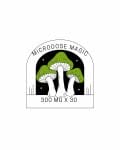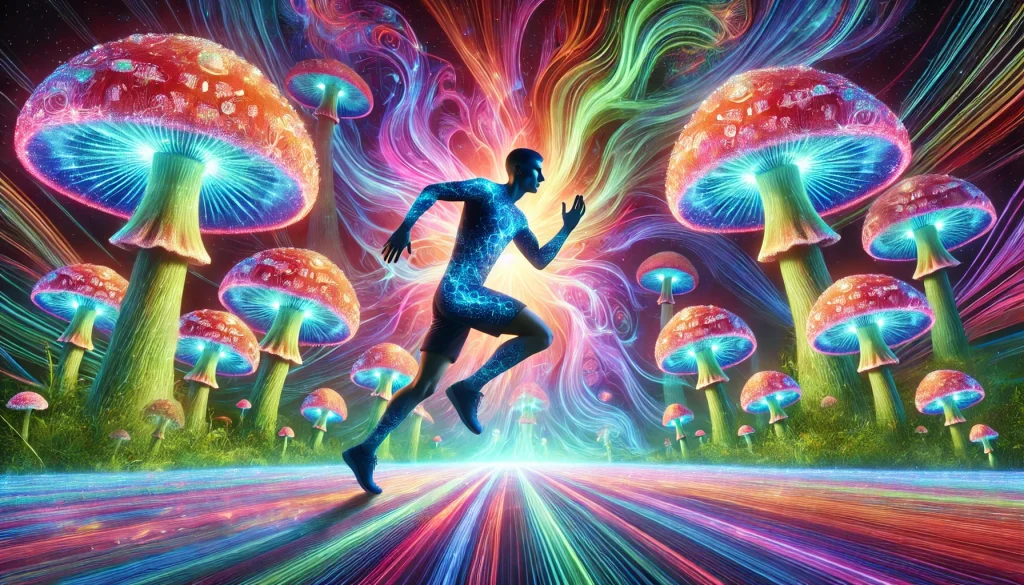In the world of sports and fitness, athletes are constantly looking for ways to improve performance, accelerate recovery, and enhance mental resilience. While traditional methods like diet, training, and supplementation have long been explored, a new player is emerging on the scene: magic mushrooms (also known as psilocybin mushrooms).
Read here how magic mushrooms for athletes may have more benefits than you think
Once relegated to the fringes of psychedelic culture, magic mushrooms are now gaining attention for their potential benefits in sports and fitness. From improving focus and endurance to aiding in recovery and mental resilience, psilocybin is showing promise as a game-changer for athletes.
What Are Magic Mushrooms?
Magic mushrooms are fungi that contain the psychoactive compound psilocybin, which the body converts into psilocin. This compound interacts with serotonin receptors in the brain, leading to altered perception, improved mood, and enhanced cognitive function.
Recent research has demonstrated that psilocybin can have profound effects on mental health, including reducing anxiety and depression, enhancing creativity, and improving problem-solving skills. These same benefits may extend to athletes, helping them perform at their best both physically and mentally.
Magic Mushrooms For Athletes?
1. Enhanced Focus and Mental Clarity
Athletes rely heavily on focus, concentration, and mental clarity to perform at their peak. Magic mushrooms, particularly in microdoses (sub-perceptual doses of psilocybin), have been shown to enhance cognitive function, reaction times, and mental resilience.
- Studies suggest that psilocybin can increase connectivity between different brain regions, improving problem-solving skills and decision-making.
- Athletes who practice mindfulness or meditation may find that psilocybin enhances their ability to stay present and engaged during training or competition.
- Improved focus can lead to better hand-eye coordination, strategic thinking, and overall performance in high-pressure situations.
2. Improved Endurance and Stamina
One of the most promising potential benefits of magic mushrooms for athletes is enhanced endurance and stamina. While psilocybin does not directly increase physical strength, it can impact perception, which may help athletes push past fatigue.
- Altered perception of time and effort: Some athletes report that psilocybin allows them to push through pain barriers and fatigue by reducing their perception of effort.
- Increased oxygen efficiency: Some evidence suggests that psilocybin may improve oxygen uptake, which can be beneficial for endurance athletes like runners, cyclists, and swimmers.
- Heightened motivation: Many athletes experience a deep sense of motivation and connection to their sport while under the effects of psilocybin, which can improve training consistency.
3. Faster Recovery and Reduced Inflammation
Post-workout recovery is crucial for athletes, and psilocybin may offer significant benefits in this area.
- Reduced inflammation: Studies have suggested that psilocybin can have anti-inflammatory properties, which may aid in muscle recovery and reduce the risk of overuse injuries.
- Pain management: Some research indicates that psilocybin may help with pain perception, allowing athletes to recover more comfortably and return to training sooner.
- Improved sleep quality: Recovery is closely linked to sleep, and psilocybin has been shown to promote deep, restorative sleep, which is essential for muscle repair.
4. Mental Resilience and Stress Reduction
Athletic performance isn’t just about physical strength—it’s also about mental toughness. Magic mushrooms may help athletes develop greater resilience and reduce stress.
- Lower anxiety and stress levels: Psilocybin has been shown to reduce cortisol (the stress hormone), which can be beneficial for athletes facing high-pressure competitions.
- Enhanced emotional regulation: Many athletes experience performance anxiety, burnout, or self-doubt. Psilocybin can help create a more balanced mindset.
- Increased adaptability: Some athletes report that psilocybin helps them approach challenges with a growth mindset, making them more adaptable to setbacks or losses.
5. Creativity and Flow State Enhancement
The flow state is a mental state in which an athlete is fully immersed in their performance, often described as being “in the zone.” Many athletes and coaches strive to cultivate this state, as it leads to effortless performance, increased creativity, and peak efficiency.
- Psilocybin can enhance the ability to enter a flow state by reducing mental chatter and promoting an open, adaptive mindset.
- Many athletes report feeling more connected to their sport, their body, and their environment while using psilocybin in small doses.
How Athletes Are Using Magic Mushrooms
Microdosing for Daily Performance
One of the most popular ways for athletes to use magic mushrooms is through microdosing. A microdose is typically 1/10th to 1/20th of a standard psychedelic dose, meaning it does not cause hallucinations or impair function.
Potential benefits of microdosing for athletes:
- Enhanced focus and reaction time
- Reduced anxiety and stress before competitions
- Improved mood and motivation
- Increased neuroplasticity (helping the brain adapt to new skills)
Macrodosing for Recovery and Mindset Shifts
While microdosing is used for daily performance benefits, some athletes explore higher doses (macrodosing) in controlled settings for deeper mental and emotional growth.
- Macrodosing may help athletes process past injuries, trauma, or mental blocks that affect performance.
- Some athletes report that macrodosing improves their relationship with their sport, leading to more enjoyment and long-term success.
- Guided psychedelic experiences are being explored for team bonding and leadership development in professional sports.
Are Magic Mushrooms Legal for Athletes?
The legality of magic mushrooms varies by country and region. While some places have decriminalized or legalized psilocybin for therapeutic use, it remains a controlled substance in many areas.
Athletes should check their local laws and anti-doping regulations before using magic mushrooms. Some professional sports organizations, including the World Anti-Doping Agency (WADA), currently prohibit psilocybin. Though there is growing discussion about changing these rules as research progresses.
Potential Risks and Considerations
While psilocybin offers many potential benefits, athletes should be aware of possible risks:
- Legality: As mentioned, laws regarding psilocybin vary, so athletes should proceed with caution.
- Dosage sensitivity: Psilocybin affects individuals differently, so careful dosing is crucial to avoid negative experiences.
- Mental health considerations: Those with a history of mental health conditions should consult a professional before trying psychedelics.
- Dehydration and coordination: High doses can impair coordination and hydration levels, which is a concern for all athletes.
The Future of Magic Mushrooms in Sports
As research into psilocybin expands, it’s likely that its role in sports performance and recovery will continue to grow. Some believe that, within the next decade, psilocybin-assisted training programs and recovery protocols may become mainstream in professional and amateur sports.
With increased scientific backing, changing public perception, and potential legal shifts, magic mushrooms could become a key tool for athletes looking to optimize their performance and well-being.
Final Thoughts
Magic mushrooms are emerging as a potential game-changer for athletes seeking mental clarity, endurance, recovery, and stress resilience. Whether used in microdoses for daily growth, psilocybin is proving to be a fascinating new frontier in sports science.
Early findings suggest that athletes that explore alternative approaches may find shrooms to be a powerful ally.
Would you try magic mushrooms to enhance your athletic performance? Let us know your thoughts in the comments!

